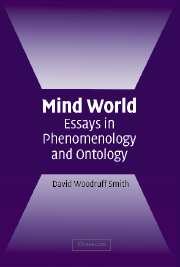Book contents
- Frontmatter
- Contents
- Prolegomena: The Terroir of Consciousness and the World
- Origins of the Essays
- Overview: A Story Line
- The Picture
- 1 Three Facets of Consciousness
- 2 The Cogito circa a.d. 2000
- 3 Return to Consciousness
- 4 Consciousness in Action
- 5 Background Ideas
- 6 Intentionality Naturalized?
- 7 Consciousness and Actuality
- 8 Basic Categories
- Coda: The Beetle in the Box
- Appendix: Background Conceptions of Ontology, Phenomenology, Philosophy of Mind, and Historical Philosophy
- Index
- References
7 - Consciousness and Actuality
Published online by Cambridge University Press: 05 June 2012
- Frontmatter
- Contents
- Prolegomena: The Terroir of Consciousness and the World
- Origins of the Essays
- Overview: A Story Line
- The Picture
- 1 Three Facets of Consciousness
- 2 The Cogito circa a.d. 2000
- 3 Return to Consciousness
- 4 Consciousness in Action
- 5 Background Ideas
- 6 Intentionality Naturalized?
- 7 Consciousness and Actuality
- 8 Basic Categories
- Coda: The Beetle in the Box
- Appendix: Background Conceptions of Ontology, Phenomenology, Philosophy of Mind, and Historical Philosophy
- Index
- References
Summary
Abstract. Alfred North Whitehead elaborated an ontology of process that we can use to frame a novel ontology of consciousness and cognition. Whitehead amplified the familiar notion of temporal process (“all is flux,” echoing Heraclitus) in an ontology that presages today's dynamical systems theory, with obvious application to both events in nature and events of consciousness. But Whitehead also developed a different and deeper notion of process: what I call “ontological becoming,” as opposed to temporal becoming. Ontological becoming, I propose, is the formal structure realized in the material structure of temporal becoming. Both apply to processes in general and to processes of consciousness in particular. From Whitehead's ontology we can thereby begin to learn how we might develop an ontological “systematics,” a broad and fundamental framework that gives consciousness its due along with the rest of the world.
Segue. In “Intentionality Naturalized?” we argued that the theory of mind needs a broad and sensitive ontology that places consciousness in the structure of the natural world while preserving the phenomenological character of conscious experience. As we saw in that essay, one approach to a sufficiently rich ontology borrows from Husserl, developing not only his analysis of the structure of intentionality, but also his distinction between formal and material ontology (see “Basic Categories” in Chapter 8). A still more radical approach is found in Whitehead's process ontology, to which we turn here, looking for a model of how to analyze consciousness in a wider structure of the world. In the long run the aim is to borrow from Whitehead's “depth” ontology (as I shall call it) to build a framework for an ontology that respects both physical and phenomenological structure.
- Type
- Chapter
- Information
- Mind WorldEssays in Phenomenology and Ontology, pp. 211 - 241Publisher: Cambridge University PressPrint publication year: 2004



